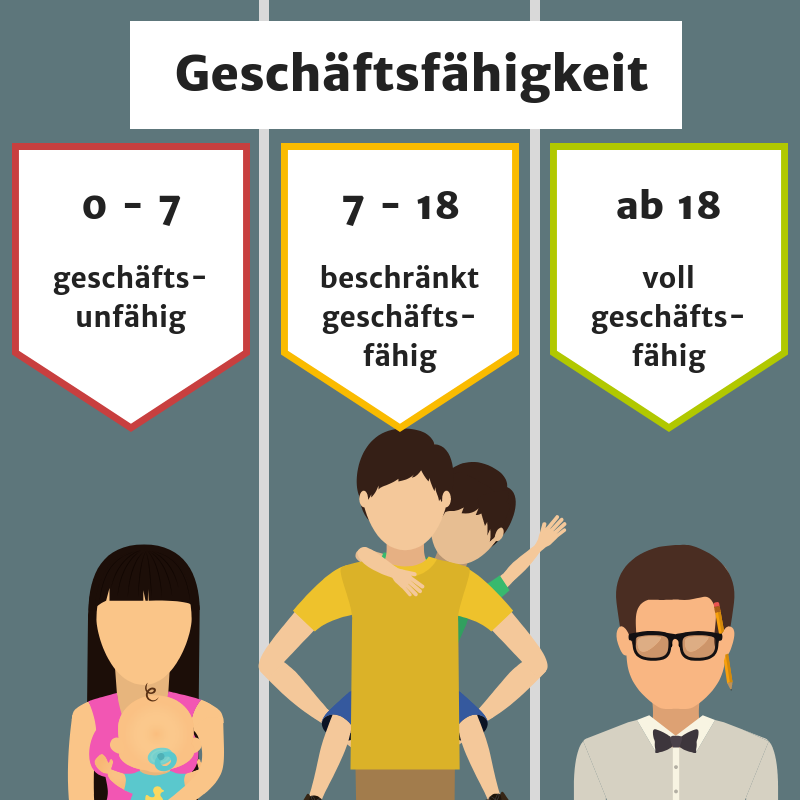Whether it's a savings contract, a free current account or an overdraft facility for young people: many banks advertise special products to attract young customers. But contracts with minors are not automatically valid.
“My money, my account, my card”. Many banks use these or similar advertising slogans to attract young customers – sometimes including T-shirts, discount cards for fast food chains or similar. Young people who are in training are often offered a free checking account. But savings contracts or capital-forming investments should also be brought to young customers at an early stage. However, contracts with minors are not automatically valid.
Even seven-year-olds are allowed to conclude certain contracts
Children under the age of 7 cannot effectively conclude contracts at all. This is intended to protect them from disadvantages that they may suffer due to a lack of experience or understanding. Anyone between the ages of 7 and 17 already has limited legal capacity and can, among other things, bind themselves contractually if:
- the parents and, if applicable, the guardianship court have consented to the conclusion of the contract or
- the legal transaction falls under the “pocket money paragraph” or
- the contract only brings legal benefits for the minor or
- he is in an employment relationship approved by his parents and the legal transaction relates to this.

Are children or young people allowed to accept gifts?
If children or young people receive something as a gift, they are allowed to accept the gift alone. Even if the parents are against it or don't know anything about the gift. Such a gift agreement usually only brings legal advantages – and the minor does not need to be protected from this.
For example, if eight-year-old Paul receives 5 euros in starting credit for a savings account from his parents' bank, he can accept and keep the money on his own – without asking his parents.
Parents almost always have to agree
However, the offspring is not allowed to open the savings account independently with the gift of money from the bank. It is also not possible for him to set up a checking account on his own because of the legal disadvantages. He would undertake to pay any account fees or could be sued by the bank for damages or interest.
Minors therefore need the consent of their parents to effectively open an account. This also applies to other banking contracts such as transfers, cash withdrawals or applying for a payment card. If the minor wants to take out a loan, the special features listed below apply.
If the signature of the legal guardian is not present when the contract is concluded, the contract is initially “invalid”. This means: only when the parents approve the contract does it become effective. However, both parents do not have to sign. It is enough for one person to authorize the other to say “yes”.
However, if even one parent refuses to give their consent, the contract will not be concluded. For example, if the young bank customer has ordered shares against his father's express wishes, he does not have to pay for them. If the purchase price has already been debited from the account, the bank must refund it. In return, the minor is obliged to return the securities.
General parental consent does not cover everything
So that parents do not have to approve every single legal transaction of their minor children, they can give general consent in advance, within certain limits. However, this does not automatically apply to subsequent contracts. For example, if the junior is allowed to open a checking account, he is not allowed to withdraw money from it without further ado.
Likewise, the minor is not allowed to overdraw his account on his own just because his parents agreed to the application for a bank card. He then has to get the blessing of his parents and the guardianship court. However, in the youth account contracts of many banks, the consent clauses are too general and therefore often ineffective.
What is the pocket money paragraph all about?
A special general consent is the so-called pocket money paragraph. If the minor pays for the desired item in cash from his pocket money or with notes that he received specifically for the purpose of concluding the contract, the purchase is valid even without the express consent of the parents. However, this only applies to everyday contracts for which pocket money is usually available.
Most banking transactions are not included, even if they are free. Credit transactions by minors are not effective even if the first installments of pocket money have already been paid.
Only the setting up of a savings account and withdrawals from the savings account within reason are covered by the general consent of the parents. So if a 14-year-old has received 100 euros from his parents to use freely and opens a savings account at the bank, the savings contract is immediately valid. The young person can also withdraw the money on their own at any time. However, if a saver has accumulated several thousand euros and wants to withdraw the entire amount, he needs his parents' permission.
What applies to working young people when it comes to banking transactions?
The law provides for something special for working young people. If the minor is already in an employment relationship (not just in vocational training) and the parents have approved the job, he or she can complete all associated legal transactions alone.
Not only can he open a salary account without his parents' consent, but he can also withdraw the full wage or salary in cash. However, he still needs the permission of his legal guardian for transfers or other banking transactions.
Can minors take out a loan?
This is only possible with court approval. A loan agreement entails repayment obligations and interest charges and, due to these disadvantages, cannot be effectively concluded by minors alone. But even parental consent is not enough for the legislature. Whether it is an overdraft of the current account or a loan for the moped purchased at the same time (financed purchase): every loan application from a minor must also be approved by the guardianship court before the bank pays out the money. Otherwise the contract will never become effective, not even through full installment payment.
This also applies if the minor is granted the loan when withdrawing it from an ATM. Without the consent of the guardianship court, he is therefore obliged to repay the money he borrowed – albeit without interest. If the young person has already used the amount for a vacation or other extraordinary things, he or she does not have to repay the loan. The parents are then also off the hook because they do not have to be responsible for their children's debts. It is only different if you have previously expressly declared your acceptance of liability to the bank.
Can adults approve their own contracts?
When you reach the age of majority, a previously concluded and not yet effective contract does not automatically become effective. However, the 18-year-old can approve such a banking transaction retroactively. However, he should think carefully about this, as he will then be fully liable for it.
Approval can also be given tacitly, for example by continuing to accept account statements or recognizing invoice statements. If the adult does not approve the conclusion of the contract, the contract must be reversed.
Is limitation of liability possible?
As long as the young person is not yet of legal age, he is liable for all debts arising from a contract approved by his parents. However, for his own protection, as soon as he reaches the age of 18, he can limit his liability in some cases – namely to the assets existing when he comes of age. This enables him to come of age without any financial burden.
An example: 17-year-old Max takes out a loan of 10,000 euros with the consent of his parents and the guardianship court. If he is broke at the beginning of his 18th year and can no longer pay the last thousand euros, he does not have to pay it back. However, he must then provide the bank with an account of his financial situation, for example by submitting a list of assets.
However, if there was no approval from the parents or the guardianship court, limitation of liability is not possible. The adult then only has the option of subsequently approving the contract themselves or declaring it finally invalid. In the first case, the indebted Max has to be responsible for his debts, but could agree with the bank to put the last installment on hold for the time being. If he refuses approval, he must repay the loan immediately.
If you have complicated questions regarding minors' law, please contact the consumer advice centers or a lawyer.


